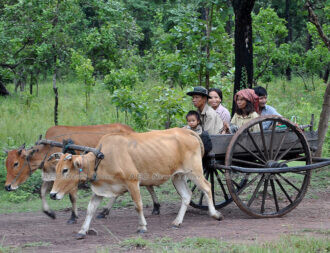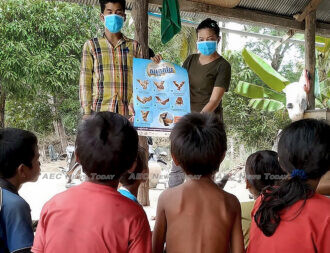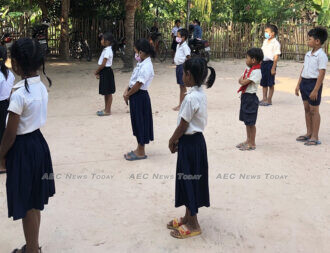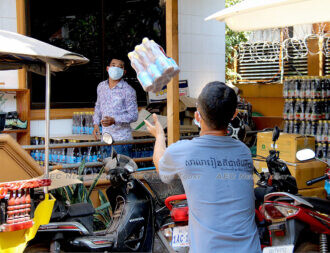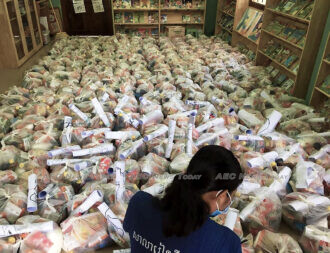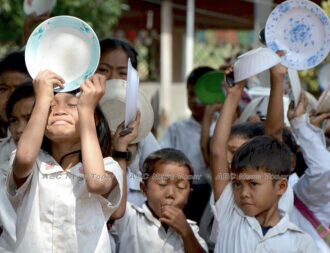Although Cambodia has escaped largely unscathed from the medical effects of the global COVID-19 pandemic the effects of lost jobs on household incomes is something else.
Across the nation families are returning to their ancestral villages as industry remains stalled and schools closed, the focus now on improving household nutrition through increased agriculture.
While the loss of education is something Cambodian youth can ill afford, the suspension of education brought with an equally pressing, that of sufficient daily nutrition.
In a country where some 32 per cent of children are stunted, 24 per cent underweight, and 10 per cent wasted, the loss of any nutrition is a cause for concern, and risks reversing the gains of recent years. .
For the Ponheary Ly Foundation (PLF), a US-registerd 501(c)3 non-profit organisation (NPO) based in Siem Reap, northeastern Cambodia, the effects of the country’s successful battle to prevent local transmission of COVID-19 has been dramatic.
Focus now on nutrition, not school
From one day having an orderly distribution network that helped keep some 2,800 Khmer children in school by providing sufficient daily meals, it was left with 2,800 at risk children with no central points for food distribution.
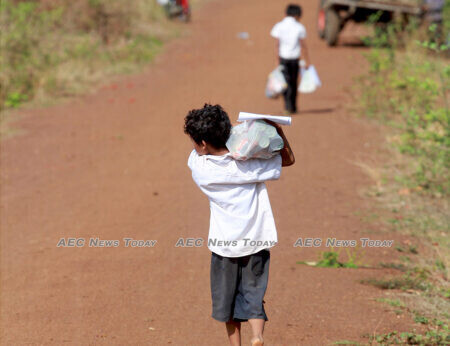
Suddenly the focus went from keeping children in school to keeping the most fragile well until school resumes, PLF president, Lori Carlson, told AEC News Today, explaining that in some areas the children went to school 12 month a year to ensure they receive sufficient daily nutrition.
“Without the supports of daily food and direct medical oversight, school is not possible for most of the children”, Ms Carlson said.
Against this backdrop PLF launched a food and hygiene distribution project for families who are struggling to feed their children in the midst of the coronavirus pandemic, particularly those families who previously relied on school meals for regular nutrition.
Describing the logistical challenges faced in establishing the non-contact food drops as “enormous”, Mr Carlson said the aim was to ensure the most vulnerable families received a food parcel every 10 days.
With Swiss NGO Stiftung Eyes Open funding the lion’s share of the food drops a major consideration was the environmental impact some 4,400 food drops a month would have if packaged in traditional plastic.
100% biodegradable bags
Stepping up with a solution was local company “Cleanbodia“, whose 100 per cent biodegradable bags made from cassava break down in the environment in under five years. The solution provided an ideal accompaniment to the work of Eco Soap Bank, a humanitarian and environmental non-profit organisation that supplies recycled hotel soap to rural communities. Up until July more than 8,500 bars of recycled soap had been distributed to families cared for by PLF
With nutrition, environment, and sanitation all checked, distribution then became the next challenge.

Ms Carlson said the foundation was fortunate not just in the support it has received from donors, but also from its alumni. More than 80 university students from the villages serviced by PLF have returned home following the education shutdown on March 16. With many past graduates of PLF-supported schools, they have been quick to rally to support PLFs “Army of Love”, taking on the heavy lifting of distribution.
With food and hygiene distribution proceedings smoothly, Ms Carlson said the primary concern now was lost education. It is estimated that barely 40 per cent of children in rural Cambodia complete primary school, while most of PLFs students don’t have internet access.
“This will be devastating,” she said, adding that PLF is working on establishing remedial classes for primary school children and projecting classes through 3G network in community centres for older students, to keep their mental ability alive. Additionally, study packs are also being sent out each week, though Ms Carlson houses deep concerns whether this is enough.
In 2019 PLF served 153,000 bowls of food to children. See here for more information on how you can support the work of the Ponheary Ly Foundation.
Related:
- Be part of the solution, not part of the pollution (Ponheary Ly Foundation)
- PLF University Students Enlist in the Army of Love (Ponheary Ly Foundation)
- City’s poorest helping to feed Valenzuela City amidst coronavirus pandemic (gallery) (AEC News Today)
Ponheary Ly Foundation photo gallery
Feature video and photos Ponheary Ly Foundation
Stella-maris Ewudolu
Between November 2010 and February 2012 she was a staff writer at Daylight Online, Nigeria writing on health, fashion, and relationships. From 2010 – 2017 she worked as a freelance screen writer for ‘Nollywood’, Nigeria.
She joined AEC News Today in December 2016.
Latest posts by Stella-maris Ewudolu (see all)
- Zoonotic crossover fear sees Vietnam ban (almost) all wildlife trade (video) – July 26, 2020
- Job & revenue losses: COVID-19 to hurt Asean airlines the most – July 24, 2020
- Philippines morning news for July 24 – July 24, 2020
- Philippines morning news for July 23 – July 23, 2020


